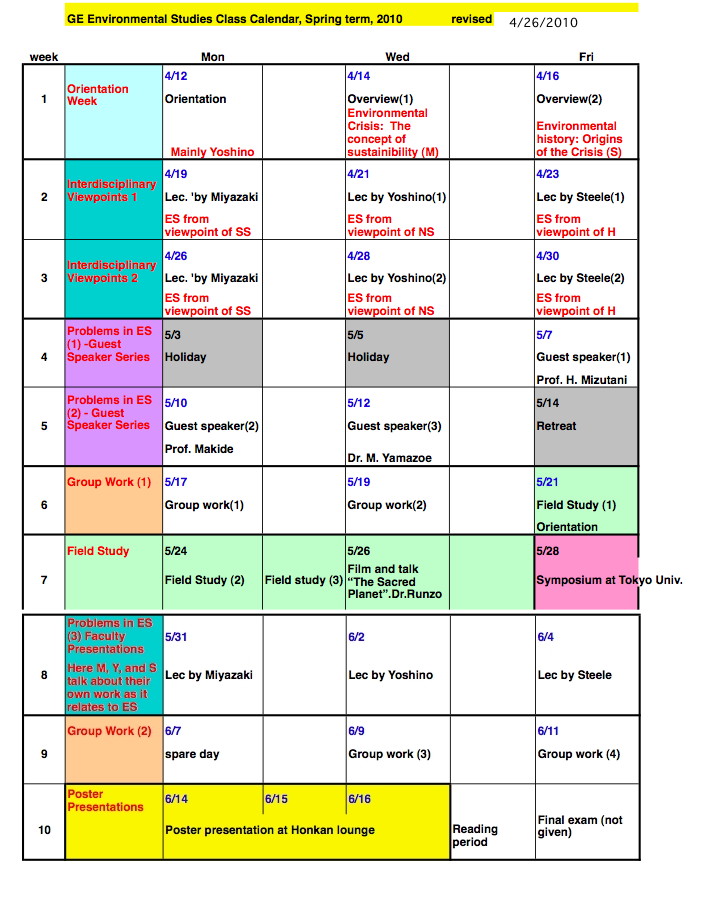担当教員: 宮崎 修行, STEELE,M.WILLIAM , 吉野 輝雄
目的 (Course Description)
This course seeks to promote the sort of environment literacy necessary for cultivation of responsible global citizens. It seeks to help students understand the basic relationship between humans and the natural environment and introduces pressing issues, ranging from environmental pollution, global warming, conservation of biological diversity, and extending to the relationship between the environment and societal changes. It encourages students to envision what they can do to promote environmental health and sustainability, , providing students with essential knowledge and fundamental tools in order to analyze environmental issues in a realistic and interdisciplinary way.
目標 (Course Learning Goals)
1) 学生が、自然環境のしくみ(物質循環、エネルギーの流れ)と地球上で生命活動を営む人間と生物の特徴を知る。
2) 人間の生活、生産・経済活動が自然環境に与えている影響と問題を認識する。
3) 自然と人間と生物とが共存でき、自然の特性を損ねることなく持続可能な世界を造るためのビジョンについて考える。
4) 人間のどんな生活もどんな仕事もどんな活動も自然環境と人間環境は深い関わりの中で営まれているという事実を理解し、環境を改善するために地球市民として どのような行動をとればよいのか考え、それぞれが(協働して)目標課題をもって行動を始める。
1) To understand the character and basic system of the natural environment (material cycles and energy flow) and patterns of human and animal/plant lives on earth.
2) To understand the influence of human life, including production and economic activities, on the natural environment, and appreciate the positive and negative consequences of such activities.
3) To seek a vision to achieve a sustainable relationship between humans and the nature environment so that humans and other living organisms may live with each other without causing damage to the natural environment.
4) To understand the fact that all human activities, including work and play, have a close relationship with the natural and human environment, and encourage students to consider how to take proper action to improve the environment.
5) To analyze the actual relationship between corporate activities and environmental impacts, so as to acquire the best knowledge to attain the ideal harmony between competition (corporate profitability) and conviviaty (living together).
6) To understand the actual difference of economic and ecological situation between developed and developing countries (south-north problems), so as to seek for the best solution and realistic compromise to drastically modify global environmental problems.
内容 (Contents)
1. What is environmental studies?
2. Geophysical and material basis of environmental issues
3. Biological environment and its assessment and conservation
4. Chemicals and water in environment, including risk assessment.
5. International and domestic policy
6. Environmental Economics
7. Environmenta History
8. The Built Environment
9. Media and environment
10. Energy resources and climate change
11. Environmental Ethics
12. Public pollution(公害問題)and environmental problems(環境問題), their significance and diference
13. Environmental Management and Auditing
14. Environmental Accounting and Corporate Management
15. Corporate Social Responsibility (CSR) and Socially Responsible Investment (SRI)
【Outline of the course】
1. Orientation and Introduction (message) from three instructors
2. What is environmental studies?
Approach from natural science
(Yoshino)
Approach from social science (Miyazaki)
Approach from humanities (Steele)
Approach from social science (Miyazaki)
Approach from humanities (Steele)
Questions to students (their interests in environmental issues)
→ classification of their
interests/ subjects
→ grouping for research work
Set-up the website for open-discussion on Moodle→ grouping for research work
3. Special lectures by guest speakers (3 persons) ← Report-1 a+b+c
4. Group research and discussion (attendance checked)
5. Field study project ← Report-2 (to be done by indivisual groups)
Nogawa river,
Asaka water purification plant,
Kodaira Sewerage Museum and Plant,
ICU Campus (campus tour and campus assesment)
Mitaka Disposal Center
Exploring the built environment of a Tokyo suburb
Asaka water purification plant,
Kodaira Sewerage Museum and Plant,
ICU Campus (campus tour and campus assesment)
Mitaka Disposal Center
Exploring the built environment of a Tokyo suburb
6. Poster presentation by each group ← peer evaluation
(open for all ICU students and faculties )
*no final examination will begiven
成績とグレーディングポリシー (Evaluation and Grading Policy)
Comments to special lectures,
Report of field study,
Individual report on environmental issues,
Poster presentation/Peer evaluation,
Attendance
参考文献 (Reference Books)Report of field study,
Individual report on environmental issues,
Poster presentation/Peer evaluation,
Attendance
● Eldon D. Enger and Bradley F.
Smith, “Environmental Science”A Study of Interrelationships, 12th ed.,
McGraw Hill (2009).
● 川合真一郎, 山本義和, 「明日の環境と人間」―地球をまも る科学の知恵―, 化学同人 (2004).
● 川合真一郎, 山本義和, 「明日の環境と人間」―地球をまも る科学の知恵―, 化学同人 (2004).
2. 不破敬一郎, 森田晶敏編著,「地球環境ハンドブック」,
朝倉書店 (2002).
3. IPCC編, 「IPCC地球温暖化第3次レポート」, 中央法規出版 (2002).
IPCC, CLIMATE CHANGE AND WATER, CC Technical Paper VI,
http://www.ipcc.ch/ipccreports/tp-climate-change-water.htm (2007).
4. 鄭 雨宗, 「地球温暖化とエネルギー問題」, 慶應義塾大学 出版会 (2008).
5. 環境省, 「環境白書」, http://www.env.go.jp/policy/hakusyo/.
6. 本間 都, 鷲尾 圭司 , 加藤 英一, 山田 国広 , 「水の循環」, 藤原書店 (2002).
7. 小倉紀雄, 「市民環境科学への招待」, 裳華房 (2003).
8. 中西準子, 「環境リスク学」, 日本評論社 (2004).
9. 日本生態系協会編著, 「環境を守る最新知識」, 信山社サイテック (2006).
10. 飯島伸子, 「環境社会学」, 有斐閣 (1993).
11. 鳥越 皓之, 「環境社会学の理論と実践」, 有斐閣 (1997).
12. 植田和弘, 「環境経済学」, 岩波書店 (1996).
13. 地球・人間フォーラム編, 「世界の環境アセスメント」, 環境庁環境アセスメント研究会監, ぎょうせい (1996).
14.その他(追加予定)
注意事項
(Note)3. IPCC編, 「IPCC地球温暖化第3次レポート」, 中央法規出版 (2002).
IPCC, CLIMATE CHANGE AND WATER, CC Technical Paper VI,
http://www.ipcc.ch/ipccreports/tp-climate-change-water.htm (2007).
4. 鄭 雨宗, 「地球温暖化とエネルギー問題」, 慶應義塾大学 出版会 (2008).
5. 環境省, 「環境白書」, http://www.env.go.jp/policy/hakusyo/.
6. 本間 都, 鷲尾 圭司 , 加藤 英一, 山田 国広 , 「水の循環」, 藤原書店 (2002).
7. 小倉紀雄, 「市民環境科学への招待」, 裳華房 (2003).
8. 中西準子, 「環境リスク学」, 日本評論社 (2004).
9. 日本生態系協会編著, 「環境を守る最新知識」, 信山社サイテック (2006).
10. 飯島伸子, 「環境社会学」, 有斐閣 (1993).
11. 鳥越 皓之, 「環境社会学の理論と実践」, 有斐閣 (1997).
12. 植田和弘, 「環境経済学」, 岩波書店 (1996).
13. 地球・人間フォーラム編, 「世界の環境アセスメント」, 環境庁環境アセスメント研究会監, ぎょうせい (1996).
14.その他(追加予定)
a. Think beyond the class
b. Interactive class (management and participation)
c. Critical (scientific) thinking
d. Group discussion and public presentation
コーススケジュール
(Course Schedule)b. Interactive class (management and participation)
c. Critical (scientific) thinking
d. Group discussion and public presentation
3/M,3/W,3/F
URL
Please go to the following url
for more details:
http://subsites.icu.ac.jp/env/
andhttp://subsites.icu.ac.jp/env/
Moodle (Environ. Studies)
Contact Address
E-mail: miyazaki@icu.ac.jp steele@icu.ac.jp yoshino@icu.ac.jp
Schedule 2010

